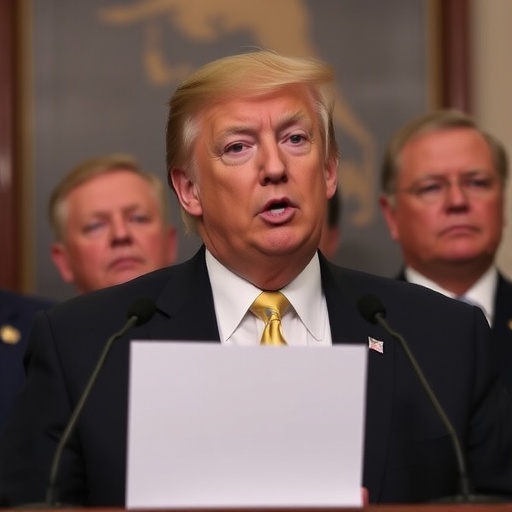Bipartisan Senators Demand Shutdown Negotiations to Avert National Crisis and Presidential Overreach
In a rare show of unity amid escalating tensions, senators from both sides of the aisle have issued a resounding call for immediate bipartisan negotiations to resolve the ongoing government Shutdown, warning that prolonged deadlock could inflict irreversible harm on the economy and erode constitutional checks on presidential power.
- Senators Unite Against Shutdown’s Mounting Human Cost
- Constitutional Alarm Bells Ring Over Presidential Powers
- Bipartisan Coalitions Form to Force Negotiation Breakthroughs
- Economic Warnings Escalate as Shutdown Drains National Resources
- Pathways Forward: Bipartisan Talks Poised to Reshape Shutdown Legacy
The impasse, now stretching into its third week, stems from deep divisions over border security funding and immigration policy. With federal agencies grinding to a halt and over 800,000 government employees furloughed or working without pay, the pressure is mounting for compromise. Senate Majority Leader Chuck Schumer (D-NY) and Minority Leader Mitch McConnell (R-KY) have both signaled openness to talks, a development that could mark a turning point in the crisis.
“This Shutdown is not just a political game—it’s a self-inflicted wound on the American people,” Schumer declared during a press conference on Capitol Hill. “We must engage in good-faith negotiations now to prevent further damage.” McConnell echoed the sentiment, adding, “Partisanship has its place, but so does pragmatism. It’s time for bipartisan solutions.”
Senators Unite Against Shutdown’s Mounting Human Cost
As the shutdown drags on, frontline stories of hardship are emerging from affected communities, fueling the urgency for negotiations. Federal workers, many of whom rely on biweekly paychecks to cover mortgages and groceries, are increasingly voicing their desperation. In a poignant example, TSA agents at major airports have reported working extended shifts without compensation, leading to heightened safety concerns and travel disruptions.
According to a recent report from the Partnership for Public Service, the shutdown is costing the U.S. economy an estimated $1.5 billion per week in lost productivity. This figure includes not only lost wages but also ripple effects on private sector jobs. Small businesses near national parks, which remain closed due to the funding freeze, are seeing revenues plummet by up to 70%, per data from the National Park Service.
Senator Susan Collins (R-ME), a moderate voice often bridging party lines, highlighted these impacts in a floor speech. “I’ve heard from constituents in Maine whose livelihoods depend on federal operations—from lighthouse keepers to research scientists. This bipartisan crisis demands negotiations that prioritize people over politics,” she said. Collins joined forces with Senator Joe Manchin (D-WV), another centrist, to co-sponsor a resolution urging immediate talks, garnering support from 15 senators across party lines.
The human element extends beyond workers. Veterans’ benefits processing has slowed dramatically, with the Department of Veterans Affairs reporting a backlog of over 100,000 claims. Food safety inspections by the FDA have been curtailed, raising alarms about potential health risks. These realities are amplifying calls for bipartisan action, as polls from Gallup show public approval for the shutdown strategy dipping below 30% nationwide.
Constitutional Alarm Bells Ring Over Presidential Powers
Beyond economic fallout, the prolonged shutdown is sparking serious debates about the balance of power in Washington. Critics, including several constitutional scholars, argue that the impasse empowers the executive branch in ways that skirt congressional oversight, potentially setting dangerous precedents.
At the heart of the controversy is President Donald Trump’s insistence on $5.7 billion for border wall construction as a condition for reopening the government. This demand, tied to his national emergency declaration earlier in the year, has drawn rebukes from both parties. “By digging in, we’re not just risking a shutdown; we’re inviting executive overreach that undermines the Constitution,” warned Senator Lindsey Graham (R-SC), a Trump ally who has surprisingly pivoted toward supporting negotiations.
Graham’s comments align with a growing chorus. A letter signed by 12 senators—six Democrats and six Republicans—circulated this week, decrying how the shutdown allows the president to bypass traditional funding mechanisms. “The framers intended Congress to hold the purse strings, not for standoffs to hand undue authority to one branch,” the letter states. Legal experts like Elizabeth Wydra, president of the Constitutional Accountability Center, elaborated in an op-ed: “This bipartisan moment of reflection could prevent a slide toward authoritarianism masked as fiscal policy.”
Historical context underscores the stakes. The 2018-2019 shutdown, the longest in U.S. history at 35 days, cost an estimated $11 billion and led to lawsuits challenging executive actions. Current projections from the Congressional Budget Office suggest this round could exceed that duration without swift negotiations, further tilting power dynamics.
Bipartisan Coalitions Form to Force Negotiation Breakthroughs
In a bid to break the deadlock, ad-hoc bipartisan groups are coalescing around specific proposals. The most prominent is the “Clean CR” initiative, championed by Senators Lamar Alexander (R-TN) and Patty Murray (D-WA), which calls for a short-term continuing resolution to fund the government through March without addressing the wall funding immediately.
This approach has gained traction, with endorsements from business leaders and economists. The U.S. Chamber of Commerce issued a statement urging Congress: “End this shutdown through negotiations—the cost to innovation and growth is too high.” Alexander, in an interview with CNN, emphasized the collaborative spirit: “We’ve seen bipartisan successes before, like the 2013 budget deal. Now’s the time to repeat history, not relive our worst mistakes.”
Other factions are pushing for comprehensive immigration reform as the ultimate solution. A working group led by Senators Dick Durbin (D-IL) and Jeff Flake (R-AZ)—though Flake is no longer in office, his influence lingers through allies—is drafting a bill that pairs border security enhancements with pathways to citizenship. Early drafts include $4 billion for technology-driven border measures, a compromise that could appeal to both sides.
Behind-the-scenes negotiations are reportedly underway in the Senate’s private cloakrooms. Sources close to leadership indicate that a vote on a bipartisan measure could come as early as next week, potentially averting disaster. However, House Speaker Nancy Pelosi (D-CA) remains a wildcard, insisting on no concessions without broader reforms.
- Key Proposals on the Table:
- Short-term funding extension to allow phased negotiations.
- Compromise border package with tech investments over physical barriers.
- Bipartisan commission to study long-term immigration solutions.
These efforts reflect a broader trend: In times of crisis, bipartisan pragmatism often emerges from the ashes of polarization.
Economic Warnings Escalate as Shutdown Drains National Resources
The financial hemorrhage from the shutdown is not abstract—it’s hitting Americans where it hurts most. Moody’s Analytics forecasts a 0.3% shave off fourth-quarter GDP growth if the stalemate persists, translating to roughly $10 billion in lost output. Stock markets have reacted nervously, with the Dow Jones dipping 1.2% in the past week amid uncertainty.
Federal contractors, a sector employing millions, are facing cash flow crises. Companies like Lockheed Martin and Boeing have halted non-essential work, leading to layoffs and delayed projects. In California alone, over 50,000 contractor jobs are at risk, according to the state’s economic development office.
Senator Cory Booker (D-NJ) addressed this in a town hall, sharing stories from furloughed IRS employees in his state. “These are the folks who process our tax refunds—now they’re the ones needing relief. Bipartisan negotiations aren’t optional; they’re essential,” he urged. On the Republican side, Senator Marco Rubio (R-FL) has warned of impacts on disaster relief, noting that FEMA’s response capabilities are compromised during hurricane season prep.
International ramifications are also surfacing. Credit rating agencies like S&P have flagged the shutdown as a risk to U.S. debt stability, potentially raising borrowing costs. Allies in Europe and Asia are watching closely, with EU officials expressing concern over delayed trade deals.
To mitigate immediate pain, some states are stepping in. New York Governor Andrew Cuomo announced $150 million in emergency loans for federal workers, a model being considered elsewhere. Yet, these band-aids underscore the need for federal negotiations.
Pathways Forward: Bipartisan Talks Poised to Reshape Shutdown Legacy
As momentum builds for bipartisan negotiations, the path ahead hinges on leadership’s willingness to compromise. White House officials have hinted at flexibility, with Trump tweeting, “Great bipartisan deals can be made—let’s get it done!” This could open doors to a deal blending security funding with humanitarian aid.
Looking further, experts predict that successful negotiations could catalyze broader reforms. The Bipartisan Policy Center outlines scenarios where a shutdown resolution leads to a grand bargain on infrastructure and entitlements, bolstering economic resilience. Failure, however, risks recurring crises, eroding public trust in institutions.
Stakeholders from labor unions to tech giants are mobilizing. The AFL-CIO has launched a campaign pressuring lawmakers, while Silicon Valley leaders advocate for smart border tech in negotiations. With midterms looming and public fatigue setting in, the incentives align for resolution.
Ultimately, this shutdown tests America’s democratic machinery. If bipartisan forces prevail, it could restore faith in collaborative governance; if not, the scars—economic, constitutional, and social—may linger for years. Watch for Senate votes in the coming days, as the nation holds its breath for breakthrough.







